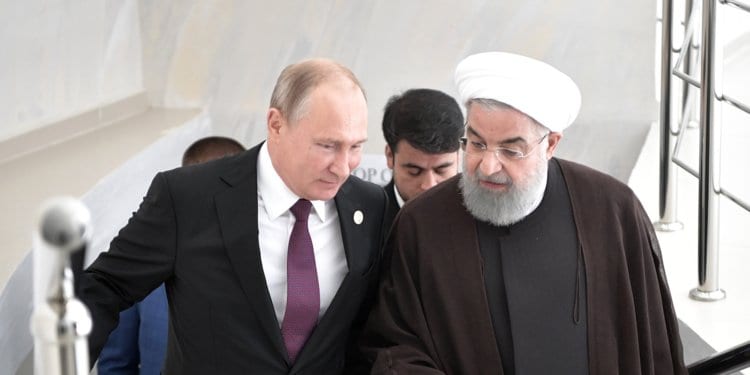Is Putin Really Gaining A Stranglehold Over The Gulf?

An article by Simon Watkins, entitled “Russia Gains Stranglehold Over Persian Gulf” and published by Oil Price.com on August 4, raises the concern that Russian-Iranian cooperation is turning into a genuine military alliance. In the article, Watkins reported that “senior sources close to the Iranian regime” told him about several ways in which Russian-Iranian military and economic cooperation are set to increase. These include plans for Russian use of two Iranian ports for its warships and nuclear subs, the deployment of hundreds of Russian military advisers to guard them, and Russian use of an Iranian airbase for its advanced Su-57 fighter aircraft—possibly for the next fifty years. In addition, these Iranian sources claim that Russia will sell S-400 air defense missile systems to Iran (the Russian sale of which to Turkey has served to further antagonize U.S.-Turkish relations). Further, Moscow will invest US$250 billion in the Iranian petroleum sector over a five year period, and in return Iran will give Russian firms preferential access to investment opportunities and other concessions (including purchasing Iranian oil at a deep discount from world market prices).
I have no doubt that Mr. Watkins is accurately reporting what these “senior sources close to the Iranian regime” told him. There is, though, reason to doubt that everything they told him is accurate or that Vladimir Putin is about to gain a stranglehold over the Gulf.
To begin with, it is highly doubtful that cash-strapped Russian firms would be able to invest US$250 billion in the Iranian petroleum sector, especially over the short period of five years. In addition to just not having this kind of money to invest, Russian petroleum firms are hardly likely to invest a lot of money just to increase the world’s supply of petroleum, which will only serve to enhance the downward pressure on oil prices that U.S. shale is already causing. If anything, Russian petroleum firms may be grateful that the Trump administration’s increased sanctions on Iran are serving to reduce Iran’s petroleum exports, and hence relieve the downward pressure on oil prices.
In addition, while the Trump administration’s economic sanctions on Iran serve to increase Iranian dependence on Russia, Tehran does not have to rely on Moscow alone. The European Union is taking some steps to continue trading with Iran despite U.S. sanctions, and China is highly likely to continue doing so as well.
Further, as Shireen Hunter recently pointed out in LobeLog, the Iranian constitution forbids granting base rights to foreign countries, and doing so would be highly unpopular with the Iranian public—as the August 2016 episode, in which the Russian defense minister announced that Russia was making use of an Iranian air base, showed. If the Russian Navy is going to make use of Iranian ports at all, Tehran will want to keep this as low-key as possible.
Why, then, would Iranian sources claim that Russian-Iranian military and economic cooperation is going to become more extensive than it is actually likely to be? An important part of the answer is undoubtedly that Tehran wants to warn U.S., European, and Arab Gulf officials that if the Trump administration continues to pressure Iran, Tehran can turn to Russia for support. But it is not at all clear that Russia would do any of the things that these Iranian sources claim it has agreed to do. Not only is Moscow unlikely to want to get involved in any conflict between the U.S. and its allies on the one hand and Iran on the other, but Putin may cynically see a benefit to such a conflict. A U.S. bogged down in an inconclusive conflict with Iran, after all, is going to be even less able than it is now to counter Russia.
Further, Moscow is undoubtedly aware that if Russia increases its military ties to Iran (as the “senior sources close to the Iranian regime” told Oilprice.com), this will result in pushing all those who (rightly or wrongly) see Iran as their primary enemy closer to the U.S. And Putin is unlikely to want to do this. Except in Syria, he has displayed a preference for pursuing an “even-handed” policy between opposing sides in the Middle East’s many conflicts, and while he strongly supports the Assad regime over its opponents in Syria, he has taken a more even-handed approach to the Turkish-Kurdish and Israeli-Iranian conflicts taking place there. Putin may want to support Iran against the U.S. to some extent, but not so much that this results in interrupting Moscow’s growing ties to the Arab Gulf states in particular. In other words, even in the unlikely event that Russia acquires a “stranglehold” over Iran, this will not allow it to acquire similar influence over the Gulf as a whole.
This is not the first occasion in which Iranian sources privately told a Western journalist or scholar about how U.S. pressure on Iran is pushing Tehran closer to Moscow. Such statements, though, will only be credible if and when the highest level Russian and Iranian officials make them publicly.





